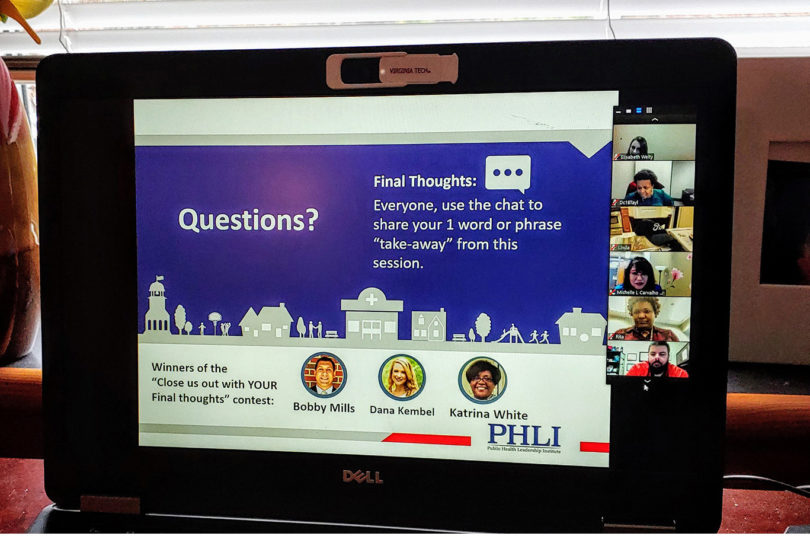COVID-19 was not on their radar in October 2019 when 28 emerging public health leaders from across the Southeast began a leadership skills program created by the University of Georgia.
Within months, however, the first fellows in the Public Health Leadership Institute (PHLI) were putting skills learned through the program into action as the pandemic rolled through the United States.
Developed by faculty at UGA’s J.W. Fanning Institute for Leadership Development, in collaboration with the Region IV Public Health Training Center (R-IV PHTC), headquartered at the Rollins School of Public Health at Emory University, the program provided a way for participants from eight Southeastern states to share resources and information as they developed leadership skills through virtual sessions.
“This has been extremely beneficial in that we are able to communicate outside of more formal channels, which usually involves emailing or calling multiple people before we are able to reach the same point as one email on the Listserv,” said Rui Zhao, an epidemiologist and communicable diseases supervisor with Louisville Metro Public Health and Wellness in Louisville, Kentucky.
In addition, the program provided invaluable personal support to participants during the pandemic, said Julie Thacker, a senior health strategist at the Nashville Metro Public Health Department in Nashville, Tennessee.
“We have shared not only resources and information, but connection, humor and support,” Thacker said. “The support from the PHLI facilitators and my peers has made me feel less alone in navigating the leadership challenges presented by the COVID-19 crisis.”
Michelle Carvalho, program manager for the Region IV Public Health Training Center, said that the way the PHLI Fellows have used the Listserv and the Zoom video meetings to share information from their agencies and support each other is one of the most inspiring and meaningful impacts of the program.
“Some of the fellows have had to take on higher formal leadership roles and responsibilities during this time as part of their agencies’ COVID-19 response, and our PHLI infrastructure is supporting them at this critical time,” Carvalho said. “Several of them have shared that they were especially appreciative of the timing of the PHLI because they have immediately used the adaptive leadership skills they have been working on to tackle their COVID-19 response.”
Between October 2019 and May 2020, Fanning Institute faculty facilitated sessions designed to help members of the program understand how culture and diversity can affect a public health leader, how to apply conflict management and group decision-making tools in their professions, and how to identify strategies to lead change in the public health sphere.
“Developing these skills helps emerging public health leaders navigate and adapt to whatever they face in their communities to build successful partnerships that help improve the quality of life in their communities,” said Carolina Darbisi, a Fanning faculty member.
Separating the PHLI from most leadership programs is its emphasis on virtual learning, with the entire institute, except for the opening retreat, taking place online.
“We utilized virtual breakout rooms and interactive tools to create an engaging virtual experience during the larger sessions,” said Brandy Walker, a Fanning faculty member. “To build upon what we discussed in each of the main sessions, the class completed work between each of the sessions and continued to communicate with each other through the class Listserv.”
In addition, fellows interacted through virtual peer consulting and individual coaching, creating a much more complex and multidimensional learning opportunity, Carvalho said.
“The virtual environment also provides a valuable networking and communication platform across an eight-state region that may not otherwise happen organically,” she said. “It allows for a broader exchange of ideas, creates ties that may be more expansive, and offers different networks than a cohort in a smaller area or within a state.”
Participants describe the PHLI as a fantastic growing experience.
“The combination of introspective and retrospective learning has been really good in helping me identify where and what I am ‘good’ at,” Zhao said. “I always find that communication or the lack thereof can greatly enhance or sink a team and the work and PHLI deepened my understanding on how to approach that in different situations.”
Meanwhile, Thacker would recommend the program to others in the public health field.
“I can honestly say this has been the best professional development experience that I’ve had in my past 10 years in public health,” she said. “The team translated the in-person experience into the virtual space in a way that has kept me and others engaged. Every module has taught me something that I have applied to my work. The best part is that I know that I will continue to benefit from what I’ve learned for a long time going forward.”
States participating in the inaugural institute include Alabama, Florida, Georgia, Kentucky, Mississippi, North Carolina, South Carolina and Tennessee.
Planning is currently underway for the 2020-21 PHLI.
For more information, visit the PHLI website. Support for the PHLI is provided through a federal grant to the R-IV PHTC from the U.S. Health Resources and Services Administration (HRSA).








